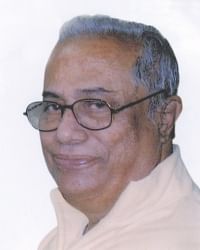| Home - Back Issues - The Team - Contact Us |
 |
| Volume 11 |Issue 21| May 25, 2012 | |
|
|
Remembrance A Man of Courage and Love Sabahat Jahan "I was always the black sheep of the family,” my father would say; “I have neither the genius of my brothers, Kabir and Munier Chowdhury, nor the strength and perseverance of my six sisters. But tell me, Sabah, have I done too badly for myself?” And I would respond, as I had done so many times before, “Abba, without a doubt, you are the best man I have ever known.” ***
My father, Shamsher Chowdhury, one of his parents' fourteen studious and obedient children, was neither studious nor obedient. He would tell me stories of religiously skipping school, only to stretch out beneath the shade of a tamarind tree and nap those tedious morning hours away, returning home a little after the school bell rang (to keep up appearances, of course); of stealing his uncle's goat and barbequing it in the middle of the night with his equally delinquent friends in the thick woods that once surrounded my grandfather's house; of tying a string around his younger sister Ferdousi [Majumdar]'s toe in order to be able to enter the house way past my grandfather's curfew (by tugging at the string and waking up my aunt, who would then quietly let him in). This was my father's mischievous side. His humanitarian side was obvious in all the jobs he gave people or helped them get, people who treated him like a demigod and respected him beyond measure—people who told their children about him, people who remain grateful to him to this day. He helped drivers put their daughters through high school and college; he helped electricians start their own independent contracting businesses; he helped cooks and bearers find better jobs and better conditions of employment; and he helped countless others receive opportunities they would otherwise never have been given. He believed in doing good for others, even those who had cheated or betrayed him. He believed in forgiving and forgetting; for him, however, this was not merely a philosophy, but a way of life. My father's courageous side pronounced itself during the dark days of 1971, when he risked his life on a regular basis, transporting medical supplies to the war-torn districts of Bangladesh (then East Pakistan) as an employee of the icddr,b (then Cholera Hospital) as well as reaching daily provisions to his sisters' homes in different parts of the city; travelling to Faujderhat Cadet College in Chittagong to rescue his elder brother Nasir Chowdhury's daughters when their parents were falsely accused and jailed for nine months (eventually released by the Mukti Bahini); arranging for his younger brother Colonel Mehboob Elahi's wife to travel to Karachi on an army plane so that she could be with her newly-wed husband; or protecting his West-Pakistani wife, my mother, and their four-year-old son, my brother, from the men who took away his own brother Munier Chowdhury at gun point, just two days before Bangladesh declared its independence from Pakistan. Those were trying times indeed—both physically as well as psychologically—and he was a hero in the truest sense of the word. I could go on writing about him forever—our home and our hearts are filled with his stories, his warmth, and his laughter. His love for us, for his parents, for his siblings, was beyond compare. He strove, always, to be a better father, a better son, and a better man. He was a sensitive and loving husband, a caring and supportive father, and an irreplaceable presence in my son's life—a doting grandfather whose unconditional love my son will miss for the rest of his life. *** I end with a memory: Whenever I happened to pass by my father's room at night, turning off the lights or turning down the television, half-asleep, he would always whisper, “Ekshota chuma [a hundred kisses].” Goodnight, Abba—and a hundred kisses to you.
|
||||
Copyright
(R) thedailystar.net 2012 |
